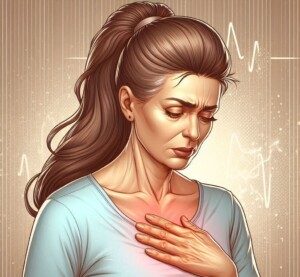Which is more common in a heart attack: shortness of breath or chest pain?
Certainly, many sufferers experience both of these symptoms.
But not all heart attacks result in both chest pain and shortness of breath.
Now even when there are multiple symptoms going on with a heart attack, it’s still a fair question:
Which is the more common symptom between feeling short of breath and feeling a pain in the chest?
Heart Attack: Chest Pain vs. Shortness of Breath
“A patient who’s having a heart attack or has blockages in his or her coronary arteries may present with a variety of symptoms,” says Waqar Khan, MD, who’s been providing state-of-the-art cardiology services to the Houston area for over 20 years, and is author of “Be Heart Smart: Understand, Treat, and Prevent Coronary Heart Disease.”
“The most common symptom that we all are aware of is chest pain,” says Dr. Khan. “Chest pain is described by many individuals in many different ways.
“Chest pain is a loose term that includes not only an aching pain in the middle of the chest or any other part of the chest, but also includes chest tightness or heaviness.
“Majority of patients who are having a heart attack will present with chest pain — but we have to remember, almost a quarter of patients with heart attack may not have any significant symptoms at all.
“A number of patients with chest pain describe radiating of pain to the left or both arms, neck, jaw or area between the shoulder blades.
“Chest pain may also be accompanied with excessive sweating or shortness of breath or both.
“Shortness of breath may be a presenting symptom of heart attack, but it is not as common as chest pain.”
The sensation of the so-called shortness of breath is also subjective:
• A seeming need to inhale or breathe at a faster than usual pace during rest.
• Feeling more winded or “out of breath” than usual after light exertion.
• Requiring a longer-than-usual time to catch one’s breath after light exertion.
• Sudden difficulty breathing in while at rest.
• Sudden difficulty exhaling while at rest.
There are many causes of isolated episodes of chest pain or issues with wind or breathing that are not related to heart troubles:
• Acid reflux or GERD
• Asthma
• Costochondritis
• LPR: laryngopharyngeal reflux disease
• Panic or anxiety attack
• Sleep apnea (waking from sleep “unable to breathe”)
• Vocal cord dysfunction
“Women do not present with typical symptoms described above, but tend to have atypical symptoms,” of a heart attack, says Dr. Khan.
“Women having heart attack may not have chest pain but instead may present with shortness of breath, nausea or excessive sweating or dizziness.”

Waqar Khan, MD, has a private practice and serves as an affiliate faculty member at Baylor College of Medicine in Houston, TX. Amazon.com/Be-Heart-Smart-Understand-Coronary/dp/1732268606
 Lorra Garrick has been covering medical, fitness and cybersecurity topics for many years, having written thousands of articles for print magazines and websites, including as a ghostwriter. She’s also a former ACE-certified personal trainer.
Lorra Garrick has been covering medical, fitness and cybersecurity topics for many years, having written thousands of articles for print magazines and websites, including as a ghostwriter. She’s also a former ACE-certified personal trainer.
.










































